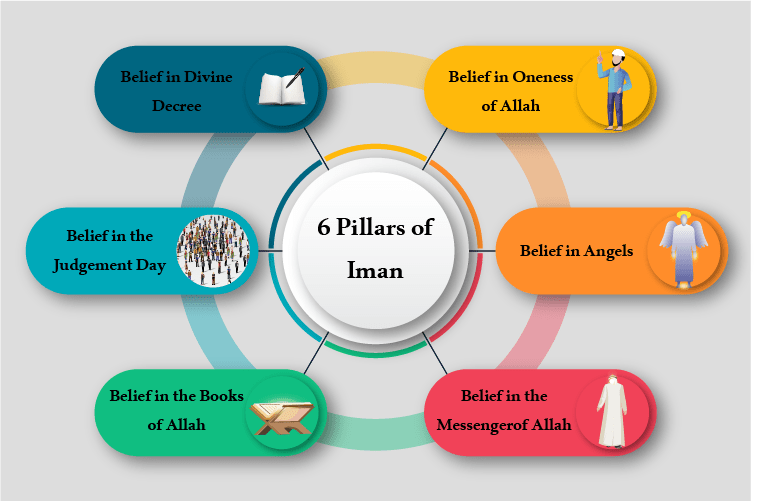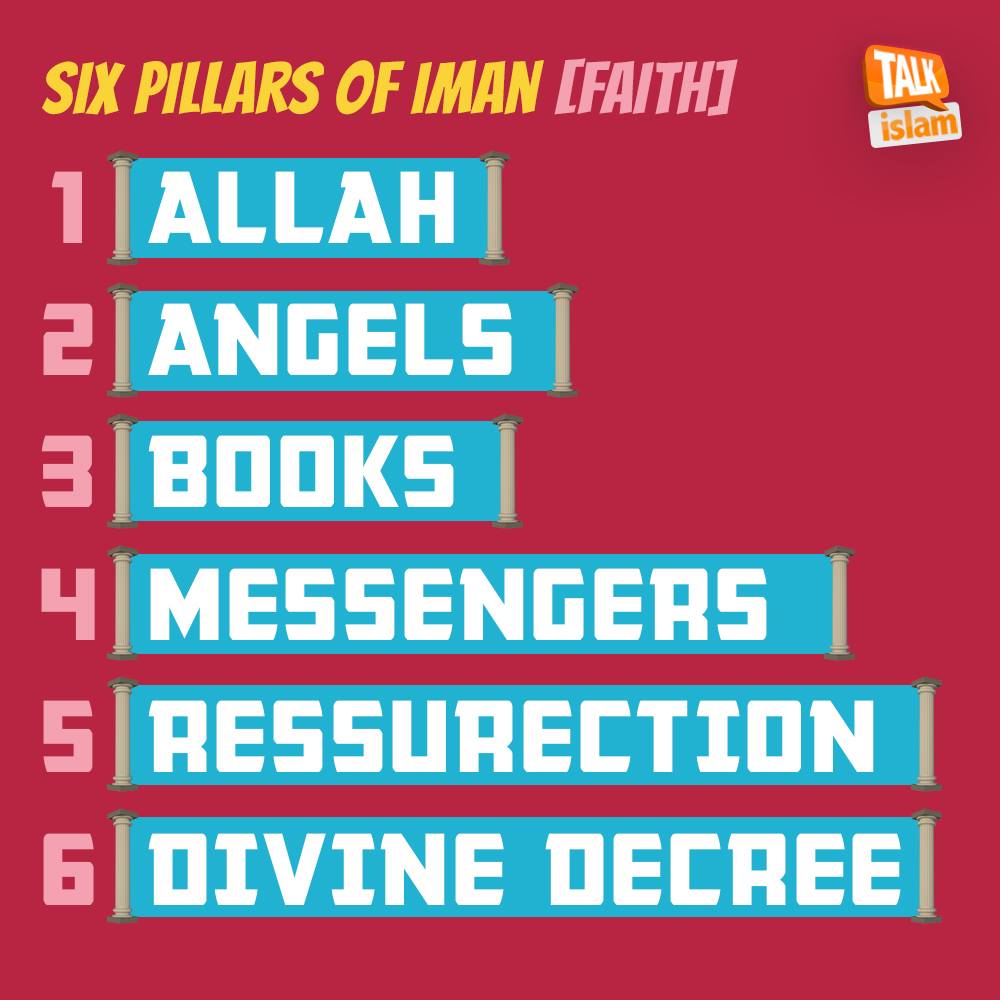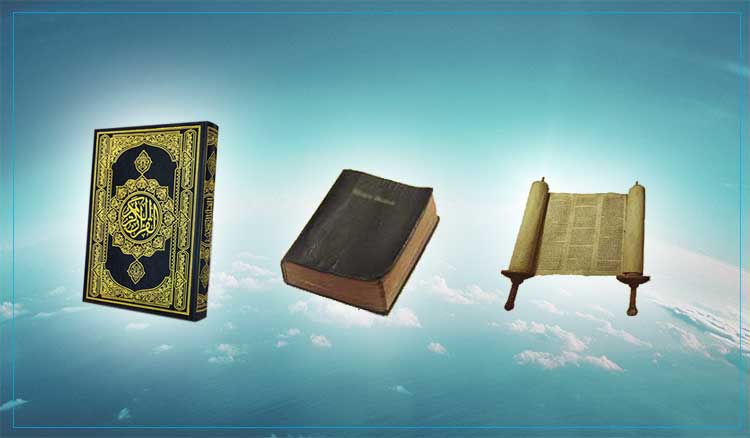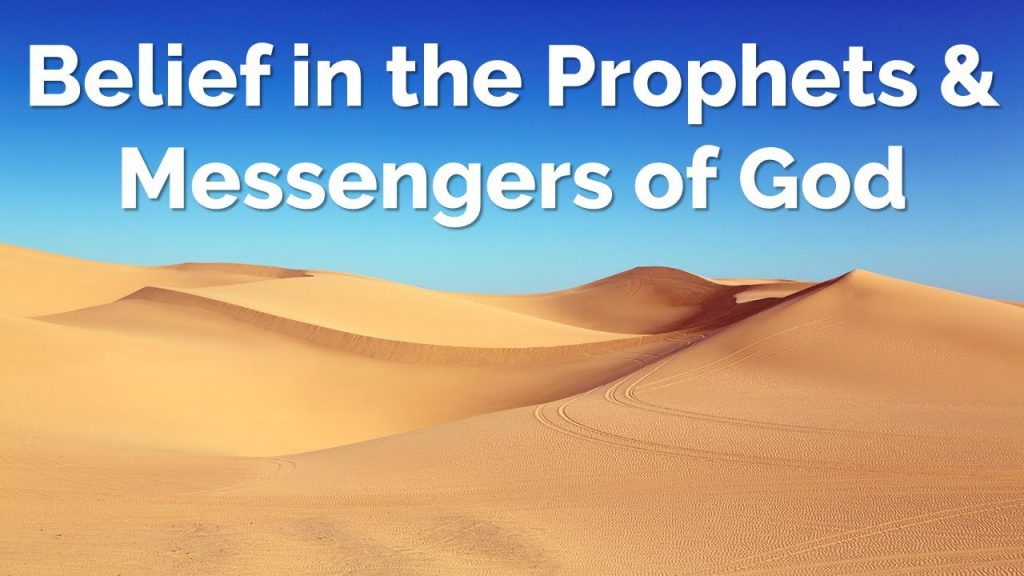6 Six Pillars Of Iman In Islam
Table of Contents
Toggle“O mankind! Remember the Grace of Allah upon you! Is there any creator other than Allah who provides for you from the sky (rain) and the earth? None has the right to be worshipped but He. How then are you turning away (from Him)? [35:3]
Every Muslim should know about the six pillars of Iman in Islam moreover those are new ones as it is very essential after the 5 Pillars of Islam. Therefore, this article covers the most important matters every Muslim should believe in as a Muslim which are the 6 Pillars of Iman. You will find good explanations for each of them and what you should know about them.
Faith in Islam stands on six pillars and this was taught to the Muslims in a famous narration of the Prophet (peace be upon him). He said: Faith means to believe in Allah, His angels, His Books, His Messengers, the Last Day, and the Divine Decree, both good and bad.
The word Iman stems from the Arabic word Amina, which means safety/security in English. So, if you have the quality of Iman, then you will get protected and safe in what happens in this life. Iman makes a person lead life according to the teaching of Islam.
Imaan (Faith) is a crucial part of a Muslim’s life, and there are Six Pillars of Faith. These are based on the Prophet Muhammad’s (PBUH) Sunnah and the Holy Quran. The following Quranic verse explains its significance:
“O you who believe! Keep faith in Allah and His Messenger and the Book which He revealed to His Messenger, and the Book which He revealed before. Whoso disbelieves in Allah, His angels, His Books, and His Messengers and the Last Day, he verily has wandered far astray.” (4:136)
What Are The 6 Six Pillars Of Iman
Now, let’s talk about the Pillars of Iman. It was narrated that ‘Umar said:
“We were sitting with the Prophet Muhammad PBUH when a man came to him in white cloth and black hair with no signs of travel, and none of us recognized him. He sat down facing the Prophet PBUH, with his knees touching his, and he put his hands on his thighs and said:
“O Muhammad, what is Iman (faith)? The Prophet PUUH replied, ‘Iman is to believe in Allah SWT and to believe in His Angels, Books, Messengers, the Final Day, and Destiny (Al-Qadar) and its good & bad consequences.’ ‘You have told the truth…”. (Saheeh Muslim)
Start learning Quran, Arabic and Islamic Studies from the comfort of your Home with the Best Online Islamic School.
Learn Quran, Arabic & Islamic Online
6 Pillars Of Iman In Order

1- Belief In Allah (Faith)

The most important Pillar is the Belief in the Existence and Unity of Allah. This is the fundamental and most essential pillar of Iman: there is only one God. Allah is the Greatest; He is the only one worthy of worship; He has no companion; this concept is Tawheed.
Allah SWT says in the Holy Quran:
“قُلْ هُوَ اللَّهُ أَحَدٌ، اللَّهُ الصَّمَدُ، لَمْ يَلِدْ وَلَمْ يُولَدْ، وَلَمْ يَكُنْ لَهُ كُفُوًا أَحَدٌ”
“Say, He is Allah, [who is] One, Allah, the Eternal Refuge. He neither begets nor is born, Nor is there to Him any equivalent.” Quran [112:1-4]
Iman in Allah consists of 4 matters:
1- Iman in the existence of Allah.
2- Iman that Allah alone is the Lord, without any partners.
3- Iman in His servitude.
4- Iman in His Names and Attributes.
This entails believing in Allah and His Attributes according to the teachings of the Qur’an and Sunnah (teachings of Prophet Muhammad). A Muslim believes that Allah has unique Names and Attributes that no one else has. There is nothing on the planet that compares to Him SWT.
There is nothing like unto Him, and He is the All-Hearer, the All-Seer. (24:11)
Iman in Allah includes believing that Allah exists and that His Existence is without the time and without place; unlike the existence of the created things, He does not need a place.
Iman that Allah SWT is not a body and has no organs. Iman that there is one and there is no god but Him SWT. Iman that He SWT does not have a partners.
He –the Almighty has no comparable and no one is like Him SWT. He creates everything, all the creatures are in need of him. He does need anyone. He is the Greatest.
Differences between the Creator and His creation:
– He is free of any need for others.
– He is the sole Creator of all that which pleases Him (and that which doesn’t).
– Allah has ordered His creation and forbidden them only in ways that are in their best interest.
– He sent the Messengers and the books with the truth Ilm-ul-Ghaib.
2- Belief In Allah’s Angels
The second pillar of Iman is to believe in the existence of Angels. Why does Allah want us to believe in Angels? Allah created angels from light before humans were designed only to worship him. As Allah mentions in Quran:
“And those nearest to Him are not too proud to worship Him, nor do they tire.” Quran [21:19]
We as Muslims must believe in angels because they constantly record our actions. Also, the revelation from God SWT to Muhammad (PBUH) was through an Angel, i.e., Jibraeel (A.S), the closest angel of God. Also, blowing the trumpet on Judgment Day, taking the souls of individuals (for example, the angel of death), and being the guardians of heaven and hell, are some of the different duties of angels. God mentions in the Qur’an to the angels:
Allah clearly confirmed the importance of this pillar in the Holy Qur’an as He says in Surah An-Nisa:
“O you who have believed, believe in Allah and His Messenger and the Book that He sent down upon His Messenger and the Scripture which He sent down before. And whoever disbelieves in Allah, His angels, His books, His messengers, and the Last Day has certainly gone far astray.”
“who never disobey whatever Allah orders—always doing as commanded.“ Quran [66:6]
The Muslim must believe in the existence of angels, that they are God’s creation, and that some of them are named. Among these names are Gabriel, Michael, Israfil and Malik.
Muslims also believe in the attributes of angels that are described in the Qur’an and the teachings of the Prophet Muhammad (may God bless him and grant him peace). For example, it is taught that angels were created from light and that the angel Gabriel has six hundred wings.
Angels are assigned to perform certain tasks. Below are the names of the angels including their mission:
Gabriel (Gabriel) – the supreme angel responsible for communication between God and his prophets, as well as for sending revelations to the Messenger.
- Jibreel (Gabriel) – in charge of communication between Allah’s to His prophets, as well to send the revelation to the messenger.
- Israfeel (Raphael) – in charge of blowing the trumpet starting the Day of Judgment
- Mikail (Michael) – in charge of giving sustenance to the human being.
- Munkar & Nakeer – in charge of questioning the human soul after death in the grave about their deeds during life.
- Malak Al-Maut / Izrael (Angel of Death) – in charge of taking the souls from the body at the time of death.
- Malik – in charge of the guardian of hell
- Ridwan – in charge of guardian of heaven
- Ateed – writing all the bad deeds of a human during the world’s life.
- Raqeeb – writing all the good deeds of a human during the world’s life.
Whatever name we don’t know, we generally believe in them and believe everything we know about their characteristics and actions. In terms of rank: they are honorable slaves who worship God.
They do not have any of the attributes of divinity. They are part of the unseen world, God created them from light.
A’isha narrated: The Messenger of Allah said,
“The angels were created from light, the jinn were created from a smokeless flame of fire”.
As far as actions are concerned: They worship Allah, glorify Him and do whatever they are commanded to do.
As for obedience, God has blessed them with complete submission to His command and strength in carrying it out. They have an innate nature to obey.
And the number of angels is countless except by Allah. Among them are the bearers of the Throne, the Guardians of Paradise, the Guardians of Hell, the Guardians, the Recorders, and others.
Among them, seventy thousand angels pray daily in al-Bayt al-Maʿmur (the Frequented House); when they leave, they never return to it ever again.
It is very important for Muslims to believe that each person has two angels with him who record all their deeds in a book, regardless of whether they are good deeds or sins.
3- Belief In Allah’s Books
The third, Iman in the Devine Books, is to have an unequivocal belief that Allah revealed books to His prophets and messengers as a means of guidance for His slaves. They are from His actual Speech and whatever they contain is truth with no doubt in it whatsoever.
Allah sent down books to his messengers. These books are evidence of humankind. Quran is the last book from Allah to Prophet Muhammad (S.A.W.). Previous revelations were for specific nations, but the Quran is guidance for the whole of humanity.
Among them are those that Allah named in the Qur’an, and there are others that none know of their names or number except Allah.
The number of divine books mentioned in the Qur’an:
- Scrolls (Suhof) to Ibrahim (Ibraham),
- Psalms (Zaboor) to Prophet Dawud (David),
- Torah (Torah) to Prophet Musa (Moses),
- Gospel (Injeel) to Prophet Isa (Jesus),
- Holy Quran (Final & Last Revelation) to Prophet Muhammad.
For every Muslim, it is necessary to believe in the books of God, but a Muslim must follow the commands of the Qur’an only because it is the last and final revelation. In addition, we act according to the provisions of whatever has not been abrogated from them with satisfaction and submission. And whatever we do not know of the names of the books mentioned, we generally believe in them.
4- Belief In Allah’s Messengers
The fourth pillar of Iman is to believe in all the messengers sent from Allah. Muslims should believe in all the messengers from Adam (A.S.) to Prophet (SAW); Muslims must believe in all the messengers in the same way they have a belief in the last messenger of Allah, i.e., Prophet Mohammad (S.A.W). 25 prophets are mentioned in the Quran, and some believe that there were about 124 000.
Whatever the case is, a Muslim cannot be a true believer of Islam if he is questioning any of them; if he doubts any of the prophets, he is considered to be a disbeliever; he cannot be a true Muslim. Quran:
“And We certainly sent into every nation a messenger, [saying], Worship Allah and avoid Taghut.” And among them were those whom Allah guided, and among them were those upon whom error was [deservedly] decreed. Quran[16:36].
There are many prophets sent by God but the Holy Quran only quoted 25 prophets (as mentioned in the Bible):
- Adam (Adam)
- Idris (Enoch)
- Nuh (Noah)
- Hud (Eber)
- Saleh (Shaloh)
- Ibrahim (Abraham)
- Lut (Lot)
- Isma’il (Ishmael)
- Ishaq (Isaac)
- Yaqub (Jacob)
- Yusuf (Joseph)
- Ayoub (Job)
- Shu‘aib (Jethro)
- Musa (Moses)
- Harun (Aaron)
- Dhul-Kifl (Ezekiel)
- Daud (David)
- Sulayman (Solomon)
- Ilyas (Elijah)
- Al-Yasa (Elisha)
- Yunus (Jonah)
- Zakariya (Zechariah)
- Yahya (John)
- Isa (Jesus)
- Muhammad (SAW).
What is the Difference between Prophets and Messengers?
A messenger: Allah sent down specific legislation or revelation to Him, and ordered Him to convey it to those who did not know about it, or to those who knew about it and opposed it.
A prophet: is to whom Allah revealed previous legislation, to inform those around him who are members of that legislation and renew its teachings.
Thus, every messenger is a prophet, but not vice-versa. Furthermore, if the terms messenger and prophet are mentioned together, each has its own meaning; but if they are mentioned separately, one term comprises the meaning of the other.
The ruling concerning having Iman in the prophets and messengers?
It is obligatory and mandatory to believe (have Faith / Iman) in all prophets and messengers; whoever disbelieves even in one of them has disbelieved in them all.
5- Belief In The Hereafter

The Day of Resurrection is the fifth pillar of Iman. Consider there is no concept as the Day of judgment. You know that whatever you are doing, good or bad, you will not get any reward or punishment for that, then how you will lead your life. Similarly, Allah sent his guidance to all humanity; he created the Day of Judgment.
On that day, a person’s deeds will be calculated if he has enough good deeds, then he will be sent to Paradise, but if they have enough level of evil deeds, he will be sent to Hell. This is the reward and punishment Allah has announced for us. Allah says in the Quran.
“And We place the scales of justice for the Day of Resurrection so that no soul will be treated unjustly. And if there is [even] the weight of a mustard seed, We will bring it forth. And sufficient are We as an accountant.” Quran [21:47]
The Lat Day (Hereafter)is the Day of Resurrection (Day Of Judgment) in which Allah SWT revives all creation to be held to account and recompense. It is so named because there is no day after it. The people of Paradise will abide there forever, and likewise, the people of Hell will abide there forever. Its many names indicate the greatness and extreme terror of the name.
The most well-known names of the Last Day:
Day of Judgment, Day of Resurrection, Day of Reckoning, Day of Warning, Day of Loss and Gain, Day of Emergence, Day of Recompense, Day of Eternity, Day of Gathering, Day of Regrets, Deafening Noise, Great Catastrophe, Overwhelming, Inevitable, Reality, Calamity and others that Allah has mentioned in the Qur’an.
Iman in the Last Day:
It is the unequivocal belief of everything that Allah and His Messenger have informed us of regarding what will happen on that tremendous day of resurrection, gathering, accountability, the bridge, the scales, Paradise, Hell, etc.
6- Belief In Qadar (Divine Decree)
The sixth and last pillar of Iman is to believe in the Qadar. Why is thinking in Qadar necessary? It is a divine decree that whatever is happening will happen, and what happens is the will of Allah. Even a leaf cannot move without the command of Allah. Qadar is Allah knows everything, and it is written and safe in the Preserved Tablet (al-Lawh al-Mahfuz). Allah mentions in the Quran:
“Indeed, all things We created with qadar (predestination). And Our command is but one, like an eye glance.” Quran [54:49-50]
Iman in Qadar consists of four pillars:
- Allah knows everything from what is in the heart of a man to what is going on in the world.
- Iman that Allah knows the past, the present, and the future.
- Everything that has happened and will happen is recorded. Allah mentions in the Quran:
Do you not know that Allah knows what is in heaven and earth? Indeed, that is in a Record. Indeed that, for Allah, is easy. Quran [22:70]
- Whatever is the will of Allah will happen, and if it is not the will of Allah, it will not happen. There is a hadith of the Prophet (S.A.W.)
“No slave truly believes until he believes in four things: in Allah alone with no partner; that I am the Messenger of Allah; in the resurrection after death; and in the Divine Decree (Qadar).” Sunan Ibn Majah, Book 1, Hadith 85
What Is Qadaa & Qadar In Islam?
Allah made a divine decree after the creation of Adam. The word Qadar should not be confused with Qadr; Qadar is destiny, Qadr is that which has been destined, i.e. decree, thus the translation – Night of Decree. The Daily Decree. Allah decrees the daily actions of his creation.
No matter how bad a situation may be, we must always put our trust in Allah and His decree. May Allah SWT strengthen our Imaan and continuously guide us to the correct path. Ameen.
“Whatever good reaches you, is from Allah, but whatever evil befalls you, is from yourself. And We have sent you [O Muhammad], to the people as a messenger, and sufficient is Allah as Witness”. (4:79)
You May Like To Read
10 Benefits Of Memorizing Quran
Recommended Courses
Islamic Studies Course For Kids
Islamic Studies Course For Adults
Final words
If one wants the perfect level of Iman, he should work on strengthening the relationship with Allah, and the ideal way to nourish your relationship is to work on these 6 Pillars Of Iman. The stronger the level of Iman, the more you are closer to Allah, and being closer to Allah means your life is in peace. You can start with the 6 pillars of Iman which are also known as the six pillars of Islam.
Now you understand that the Pillars of Iman are completely different from 5 Pillars of Islam.
To Get Perfection In Your Iman, Join our Courses so that you can achieve the robust level of Iman. We have highly qualified teachers who can make you understand the purpose and importance of every pillar of Iman.
Our Certified Tutors will make you learn about these pillars in the most effective manner that will help you change your life, so join us and achieve the right path so that on the Day of Judgement, Allah will be happy with you. Still have a question about
FAQs

6 Six Pillars Of Iman In Arabic!
The Arkan al iman in arabic are:
1. الإيمان بالله
2. الإيمان بالملائكة
3. الإيمان بالكتب
4. الإيمان بالرسل
5. الإيمان باليوم الاخر
6. الإيمان بالقدر
6 Six Pillars Of Iman In English!
The Arkan al iman in english are:
1. Belief in Oneness of Allah
2. Belief in Existence of Angels
3. Belief in The Books of Allah
4. Belief in All of Allah’s Messengers
5. Belief in the Day of Judgment
6. Belief in the Divine Decree
Arkanul Al Iman In Arabic 6!
1. الإيمان بالله
2. الإيمان بالملائكة
3. الإيمان بالكتب
4. الإيمان بالرسل
5. الإيمان باليوم الاخر
6. الإيمان بالقدر
Arkanul Al Iman In English!
1. Belief in Oneness of Allah
2. Belief in Existence of Angels
3. Belief in The Books of Allah
4. Belief in All of Allah’s Messengers
5. Belief in the Day of Judgment
6. Belief in the Divine Decree
What Are The Pillars Of Iman
The six pillars of Iman are: faith in Allah; belief in angels; belief in literature; belief in prophets; belief in the Day of Judgment; and belief in destiny.
What is Al Iman
Islamically, it refers to the fundamental beliefs in The oneness of Allah, the prophets of Allah, the holy books of Allah, the Day of Judgment, angels, and divine destiny. Al-Iman meaning in Arabic is faith or belief.






























